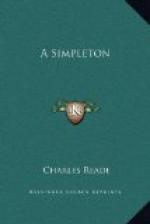He gave a loud cry, and tried to swim towards it; but encumbered with his life-buoy, he made little progress. The thing drifted abreast of him, but ten yards distant.
As they each rose high upon the waves, he saw it plainly.
It was the very raft that had been the innocent cause of his sad fate.
He shouted with hope, he swam, he struggled; he got near it, but not to it; it drifted past, and he lost his chance of intercepting it. He struggled after it. The life-buoy would not let him catch it.
Then he gave a cry of agony, rage, despair, and flung off the life-buoy, and risked all on this one chance.
He gains a little on the raft.
He loses.
He gains: he cries, “Rosa! Rosa!” and struggles with all his soul, as well as his body: he gains.
But when almost within reach, a wave half drowns him, and he loses.
He cries, “Rosa! Rosa!” and swims high and strong. “Rosa! Rosa! Rosa!”
He is near it. He cries, “Rosa! Rosa!” and with all the energy of love and life flings himself almost out of the water, and catches hold of the nearest thing on the raft.
It was the dead man’s leg.
It seemed as if it would come away in his grasp. He dared not try to pull himself up by that. But he held on by it, panting, exhausting, faint.
This faintness terrified him. “Oh,” thought he, “if I faint now, all is over.”
Holding by that terrible and strange support, he made a grasp, and caught hold of the woodwork at the bottom of the rail. He tried to draw himself up. Impossible.
He was no better off than with his life-buoy.
But in situations so dreadful, men think fast; he worked gradually round the bottom of the raft by his hands, till he got to leeward, still holding on. There he found a solid block of wood at the edge of the raft. He prised himself carefully up; the raft in that part then sank a little: he got his knee upon the timber of the raft, and with a wild cry seized the nearest upright, and threw both arms round it and clung tight. Then first he found breath to speak. “Thank god!” he cried, kneeling on the timber, and grasping the upright post—“Oh, thank god! Thank god!”
CHAPTER XVI.
“Thank God!” why, according to his theory, it should have been “Thank Nature.” But I observe that, in such cases, even philosophers are ungrateful to the mistress they worship.
Our philosopher not only thanked God, but being on his knees, prayed forgiveness for his late ravings, prayed hard, with one arm curled round the upright, lest the sea, which ever and anon rushed over the bottom of the raft, should swallow him up in a moment.
Then he rose carefully, and wedged himself into the corner of the raft opposite to that other figure, ominous relic of the wild voyage the new-comer had entered upon; he put both arms over the rail, and stood erect.




